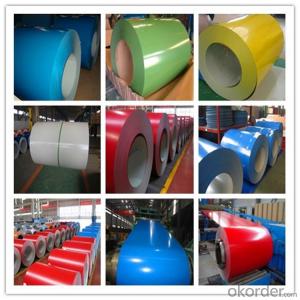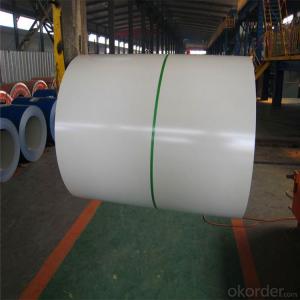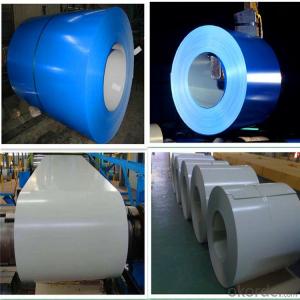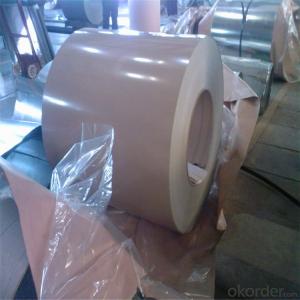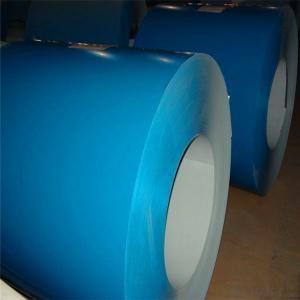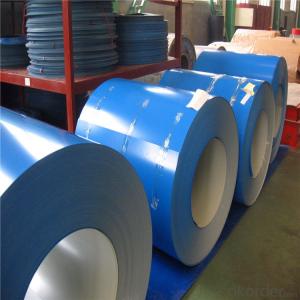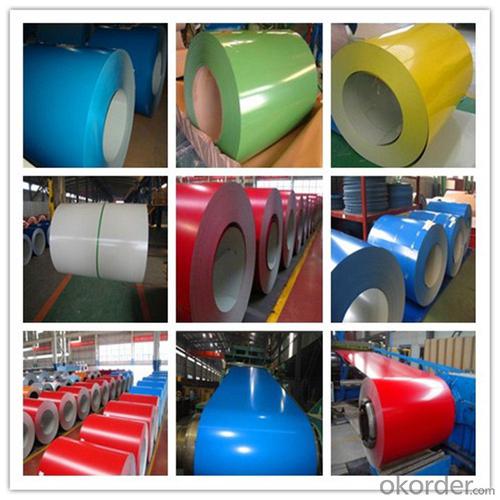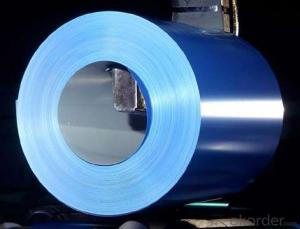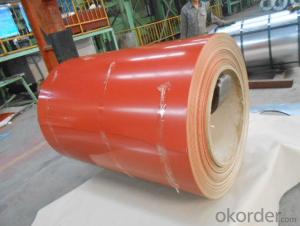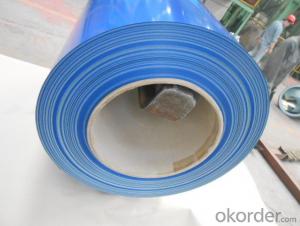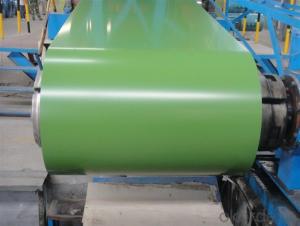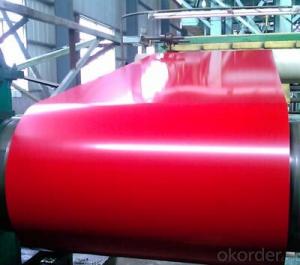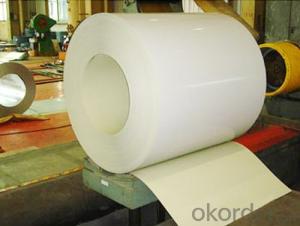China Supplier Color Coated Galvanized Steel Coil Prime PPGI
- Loading Port:
- Shanghai
- Payment Terms:
- TT OR LC
- Min Order Qty:
- 100 m.t.
- Supply Capability:
- 50000 m.t./month
OKorder Service Pledge
OKorder Financial Service
You Might Also Like
Specification
China Supplier Color Coated Galvanized Steel Coil Prime PPGI
Description of China Supplier Color Coated Galvanized Steel Coil Prime PPGI
Product | PPGI/PPGL |
Capacity | 5,000 tons/month |
Base material | Hot dipped galvanized steel |
Thickness | 0.2-2.0mm |
Width | 600-1250mm(according to your need) |
Coil Weight | 3-6tons |
Quality | SGCC, DX51D |
Color | RAL No. or customers samples’ color |
Zinc-coating | 30g/m2-180g/m2 |
Coil ID | 508mm/610mm |
Technique | Cold rolled—hot dipped galvanized—color coated |
Painting | Top painting:15~25μm |
Back painting: 6~10μm | |
Tolerance | Thickness: +/-0.02mm |
Width:+/-2mm | |
Shipment time | within 15-45 workdays |
Payment | T/T, L/C at sight |
Packing | Standard export packing |
The special order can be negotiated. | |
Application of China Supplier Color Coated Galvanized Steel Coil Prime PPGI
APPLICATION OF OUR PREPAINTED STEEL | ||||||||||
Construction | Outside | Workshop,agricultural warehouse,residential precast unit | ||||||||
corrugated roof,roller shutter door,rainwater drainage pipe,retailer booth | ||||||||||
Inside | Door,doorcase,light steel roof stucture,folding screen,elevator,stairway,ven gutter,Construction Wall | |||||||||
Electrical applicance | Refrigerator,washer,switch cabnet,instrument cabinet,air conditioning,micro-wave owen,bread maker | |||||||||
Fuiniture | Central heating slice,lampshade,chifforobe,desk,bed,locker,bookself | |||||||||
Carrying trade | Exterior decoration of auto and train,clapboard,container,isolation lairage,isolation board | |||||||||
Qthers | Writing panel,garbagecan,billboard,timekeeper,typewriter,instrument panel,weight sensor,photographic equipment | |||||||||
Products Show of China Supplier Color Coated Galvanized Steel Coil Prime PPGI

Product Advantages
1.With nearly 20 years experience in prepainted steel, accommodate different marketdemands. | ||||||||||||||
2.'Quality first, service first' is our business aim; 'The good faith get respect,cast quality market' is our Business philosophy . | ||||||||||||||
3.Having two series producttion line,with the abbual production capacity of 240000 tons. | ||||||||||||||
4.Exceed International ISO9001:2008&ISO14001:2004 quality and environmental standards | ||||||||||||||
5.Meet with ROHS standard |
Company Information
CNBM International Corporation is the most important trading platform of CNBM group.
Whith its advantages, CNBM International are mainly concentrate on Cement, Glass, Iron and Steel, Ceramics industries and devotes herself for supplying high qulity series of refractories as well as technical consultancies and logistics solutions.


F A Q
1, Your advantages?
professional products inquiry, products knowledge train (for agents), smooth goods delivery, excellent customer solution proposale
2, Test & Certificate?
SGS test is available, customer inspection before shipping is welcome, third party inspection is no problem
3, Factory or Trading Company?
CNBM is a trading company but we have so many protocol factories and CNBM works as a trading department of these factories. Also CNBM is the holding company of many factories.
4, Payment Terms?
30% TT as deposit and 70% before delivery.
Irrevocable L/C at sight.
5, Trading Terms?
EXW, FOB, CIF, FFR, CNF
6, After-sale Service?
CNBM provides the services and support you need for every step of our cooperation. We're the business partner you can trust.
For any problem, please kindly contact us at any your convenient time.
We'll reply you in our first priority within 24 hours.
- Q: What is the significance of carbon content in special steel?
- The carbon content in special steel is significant because it determines the steel's hardness, strength, and overall performance. Higher carbon content results in increased hardness and strength, making the steel suitable for applications requiring durability and resistance to wear and tear. On the other hand, lower carbon content enhances the steel's ductility and formability, making it more suitable for shaping and molding processes. Therefore, carbon content plays a crucial role in tailoring the properties of special steel to meet specific industrial requirements.
- Q: What are the different low-temperature grades of special steel?
- There are several low-temperature grades of special steel, including but not limited to: austenitic stainless steel, ferritic stainless steel, martensitic stainless steel, and duplex stainless steel. These grades are specifically designed to maintain their strength and toughness at low temperatures, making them suitable for applications in cryogenic environments.
- Q: Can special steel be used in the battery manufacturing industry?
- Yes, special steel can be used in the battery manufacturing industry. Special steel is often used in battery production for various purposes, such as in the construction of battery casings, terminals, and other components. Its high strength, durability, and resistance to corrosion make it suitable for ensuring the safety and longevity of batteries.
- Q: What are the factors affecting the cost of special steel?
- There are several factors that can affect the cost of special steel. Firstly, the cost of raw materials used in the production of special steel, such as iron ore and alloys, can have a significant impact on its overall price. Additionally, the level of demand for special steel, both domestically and globally, can influence its cost. Factors such as market competition, economic conditions, and government policies can also play a role in determining the price of special steel. Lastly, the complexity of the manufacturing process, including the level of skill required and the use of advanced technologies, can contribute to the higher cost of special steel compared to regular steel.
- Q: How does special steel perform in dynamic loading conditions?
- Special steel performs exceptionally well in dynamic loading conditions. It has high strength, toughness, and fatigue resistance, making it capable of withstanding repeated loading and impacts without failure. Its ability to absorb and distribute stress evenly helps prevent cracks and fractures, ensuring the structural integrity of components even under demanding, dynamic loading conditions.
- Q: What are the different non-destructive testing methods used for special steel?
- Some different non-destructive testing methods used for special steel include ultrasonic testing, magnetic particle testing, liquid penetrant testing, radiographic testing, and eddy current testing. These methods help to detect and evaluate any defects or abnormalities in the steel without causing any damage to the material.
- Q: How is leaded steel used in machining operations?
- Leaded steel is commonly used in machining operations due to its improved machinability. The addition of lead to the steel composition enhances its ability to be cut, drilled, and shaped with ease, reducing tool wear and improving surface finish. This type of steel is particularly useful in high-speed machining applications, where efficiency and precision are crucial.
- Q: How is special steel used in the production of injection molds?
- Due to its unique properties, special steel is widely utilized in the manufacturing of injection molds, which play a vital role in the production of various plastic and metal items through the injection molding process. The excellent heat resistance of special steel is one of the main factors behind its preference in injection molds. When the molten material is injected into the mold at high pressure and temperature, special steel can endure these extreme temperatures without warping or losing its shape. This ensures the final product's accuracy and precision. Furthermore, special steel exhibits remarkable hardness and wear resistance. Given that injection molds are subjected to frequent use, wear and tear can occur, leading to dimensional inaccuracies and a decline in product quality. By employing special steel, which is specifically designed to resist wear, the lifespan of injection molds is extended, guaranteeing consistent and high-quality production. Moreover, special steel offers good machinability, enabling the precise fabrication of intricate and complex mold designs. This capability is crucial in the production of molds with intricate geometries and precise details, which is essential for manufacturing complex plastic or metal parts. Additionally, special steel provides a superior surface finish for the molded products. The use of special steel in the creation of injection molds results in smooth and polished surfaces, ensuring that the final products possess a high-quality finish. In conclusion, special steel is extensively utilized in the production of injection molds due to its exceptional heat resistance, hardness, wear resistance, machinability, and surface finish. These properties make it an ideal material for ensuring accurate and precise manufacturing of plastic and metal products through the injection molding process.
- Q: What are the common challenges in forging special steel?
- In order to achieve desired outcomes, manufacturers and engineers must tackle several common challenges when forging special steel. One of these challenges involves maintaining precise temperature control throughout the forging process. Special steels often have specific heat treatment requirements, and any deviation from the recommended temperature range can have a negative impact on the final properties of the material. Therefore, it is crucial to achieve and sustain the appropriate temperature to ensure desired mechanical properties such as strength, hardness, and toughness. Another challenge is controlling the cooling rate during quenching. Quenching is a critical step in the heat treatment process that helps to achieve the desired hardness and strength in special steels. However, rapid cooling can lead to the formation of undesired microstructures or even cracking. Therefore, it is essential to carefully manage the cooling rate to avoid these issues and ensure optimal material properties. Additionally, shaping special steels through forging can be challenging due to their high strength and hardness. These materials are often more difficult to deform compared to regular steels, requiring higher forging pressures and specialized equipment. The resistance to deformation can result in increased wear on the forging dies, necessitating frequent maintenance and replacement. Furthermore, special steels may contain alloying elements that can affect their forgeability. Some alloying elements can promote grain growth, which can reduce the mechanical properties of the material. It is crucial to find the right balance of alloying elements and optimize the forging process parameters to achieve the desired microstructure and properties in the final product. Lastly, ensuring consistency and repeatability in the forging process can be challenging. Special steels are often produced in smaller quantities or for specific applications, making it important to maintain process control and quality assurance. Proper documentation, monitoring, and quality control measures need to be implemented to ensure that the forged special steel meets the desired specifications and performance requirements. Overall, addressing these challenges through proper process control and optimization is essential to obtain high-quality special steel products with the desired mechanical properties and performance characteristics.
- Q: How does special steel compare to other materials such as aluminum or titanium?
- Special steel, when compared to other materials such as aluminum or titanium, offers a unique set of advantages and characteristics. Firstly, special steel is known for its exceptional strength and durability. It has a higher tensile strength compared to aluminum and titanium, making it ideal for applications that require withstanding heavy loads or high-stress environments. This strength also provides resistance against wear and tear, ensuring a longer lifespan of the material. Another significant advantage of special steel is its ability to maintain its mechanical properties at extreme temperatures. While aluminum and titanium may experience a significant decrease in strength at elevated temperatures, special steel retains its structural integrity, making it suitable for applications that involve high temperatures or thermal cycling. In terms of cost-effectiveness, special steel often proves to be more affordable than titanium, especially in large-scale production. Although aluminum is generally cheaper than special steel, it may not possess the same level of strength or resistance to corrosion, which could limit its applicability in certain industries. Moreover, special steel has excellent machinability and can be easily formed into different shapes and sizes, allowing for greater design flexibility. This quality makes it suitable for various industries such as automotive, aerospace, construction, and manufacturing, where complex components or structures are required. Lastly, special steel exhibits superior corrosion resistance compared to aluminum and titanium. It can be treated or coated to provide additional protection against rust and other forms of degradation, extending its lifespan even further. In summary, special steel outperforms aluminum and titanium in terms of strength, durability, temperature resistance, and corrosion resistance. Its cost-effectiveness, machinability, and versatility make it a preferred material in various industries, where high-performance and reliability are crucial factors.
Send your message to us
China Supplier Color Coated Galvanized Steel Coil Prime PPGI
- Loading Port:
- Shanghai
- Payment Terms:
- TT OR LC
- Min Order Qty:
- 100 m.t.
- Supply Capability:
- 50000 m.t./month
OKorder Service Pledge
OKorder Financial Service
Similar products
Hot products
Hot Searches
Related keywords
